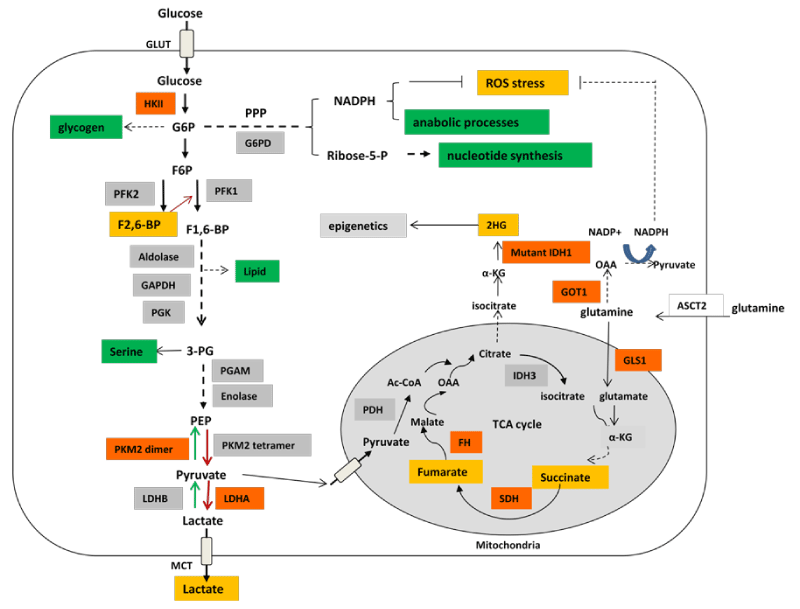 Orange: key enzymes important to cancer metabolic reprogramming; yellow: key metabolites that contribute to cancer phenotype; green: anabolic products that provide
building blocks in cancer.
Abbreviations: GLUT: Glucose Transporter; HKII: Hexokinase II; PFK1: Phosphofructokinase 1; PFK2: Phosphofructokinase 2; GAPDH: Glyceraldehyde-3-Phosphate
Dehydrogenase; PGK: phosphoglycerate Kinase; PGAM: Phosphoglycerate Mutase; PKM2: Pyruvate Kinase Muscle Isozyme 2; LDHA: Lactate Dehydrogenase A;
Orange: key enzymes important to cancer metabolic reprogramming; yellow: key metabolites that contribute to cancer phenotype; green: anabolic products that provide
building blocks in cancer.
Abbreviations: GLUT: Glucose Transporter; HKII: Hexokinase II; PFK1: Phosphofructokinase 1; PFK2: Phosphofructokinase 2; GAPDH: Glyceraldehyde-3-Phosphate
Dehydrogenase; PGK: phosphoglycerate Kinase; PGAM: Phosphoglycerate Mutase; PKM2: Pyruvate Kinase Muscle Isozyme 2; LDHA: Lactate Dehydrogenase A;MCT: Monocarboxylate Transporter; G6PD: Glucose-6-Phosphate Dehydrogenase; SDH: Succinate Dehydrogenase; FH: Fumerase; G6P: Glucose-6-Phoaphate; F6P: Fructose-6-Phosphate; Fructose-F1:6-BP: Fructose-1:6-Bisphosphate; Ribose-5-P: Ribose-5-Phosphate; Ac-CoA: Acetyl-CoA; α-KG: α-ketoglutarate; 2HG: 2-Hydroxyglutarate; IDH: Isocitrate Dehydrogenase; ASCT2: Solute Carrier Family 1 (Neutral Amino Acid Transporter): Member 5 (also called SLC1A5); OAA: Oxaloacetate; PDH: Pyruvate Dehydrogenase; GOT1: Aspartate Transaminase 1; ROS: Reactive Oxygen Species; GSH: Glutathione